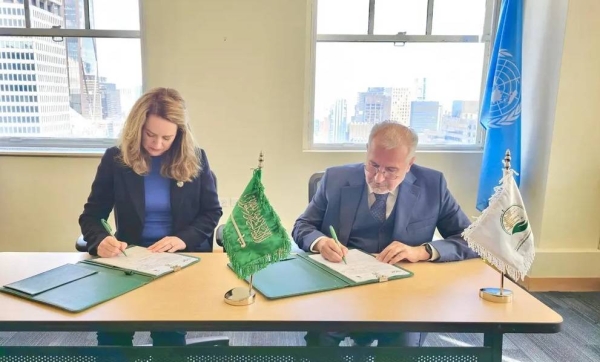The King Salman Humanitarian Aid and Relief Center (KSrelief) has recently signed a cooperation agreement with the International Organization for Migration (IOM) aimed at improving sanitation services for the displaced population and host communities in Marib Governorate, Yemen. The agreement, with a total budget of $2.25 million, was signed during the 79th session of the United Nations General Assembly in New York by Dr. Abdullah Al Rabeeah, Advisor to the Royal Court and KSrelief Supervisor General, and IOM Director General Amy Pope. The initiative focuses on enhancing access to safe sanitation facilities and waste management services in Marib by constructing 200 household latrines, reconstructing 600 cesspits, and providing waste management equipment. This project is expected to directly improve the living conditions of approximately 47,598 individuals and benefit an additional 137,580 people indirectly.
This collaboration between KSrelief and IOM is part of Saudi Arabia’s ongoing commitment to supporting the Yemeni people by providing essential services and advancing the water and environmental sanitation sector. By investing in projects that focus on improving sanitation services, Saudi Arabia hopes to address the urgent needs of the displaced population and host communities in Marib Governorate. The construction of household latrines and the provision of waste management equipment will not only enhance living conditions for thousands of individuals but also contribute to the overall health and well-being of the community. Furthermore, this initiative aligns with the United Nations Sustainable Development Goals, particularly Goal 6 which aims to ensure access to water and sanitation for all.
In addition to enhancing sanitation services, the cooperation agreement between KSrelief and IOM also highlights the importance of partnerships in humanitarian efforts. By working together, these organizations are able to leverage their resources and expertise to make a greater impact on the ground. The signing of this agreement during the United Nations General Assembly demonstrates the commitment of both Saudi Arabia and the international community to addressing the humanitarian crisis in Yemen and supporting vulnerable populations in need. This collaborative approach not only strengthens the delivery of aid but also ensures that resources are used effectively to achieve sustainable outcomes.
The project in Marib Governorate is also significant in terms of its scale and scope. With a budget of $2.25 million, this initiative will reach a large number of individuals directly and indirectly, benefiting over 185,000 people in total. The construction of household latrines and the reconstruction of cesspits are essential components of improving sanitation services in the area, particularly for those who have been displaced from their homes. By addressing these basic needs, the project not only enhances living conditions but also helps to restore a sense of dignity and well-being for the affected population.
Furthermore, this agreement demonstrates the commitment of both Saudi Arabia and IOM to promoting sustainable development and resilience in Yemen. By investing in projects that focus on improving sanitation services and waste management, the partners are laying the foundation for long-term recovery and stability in the region. The provision of essential services such as safe sanitation facilities is crucial for preventing the spread of diseases and improving overall health outcomes, particularly in communities that have been affected by conflict and displacement. By addressing these needs, Saudi Arabia and IOM are contributing to the larger goal of building back better and supporting the recovery of the Yemeni people.
In conclusion, the cooperation agreement between KSrelief and IOM to improve sanitation services in Marib Governorate is a significant step towards addressing the urgent needs of the displaced population and host communities in Yemen. By investing in projects that focus on enhancing access to safe sanitation facilities and waste management services, Saudi Arabia and its partners are not only improving living conditions but also contributing to the overall health and well-being of the community. This initiative underscores the importance of partnerships in humanitarian efforts and demonstrates the commitment of both Saudi Arabia and the international community to supporting vulnerable populations in need. Through collaborative and sustainable approaches, the partners are working towards building back better and promoting resilience in Yemen.

















































